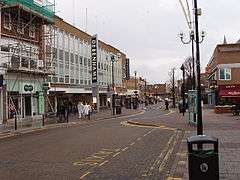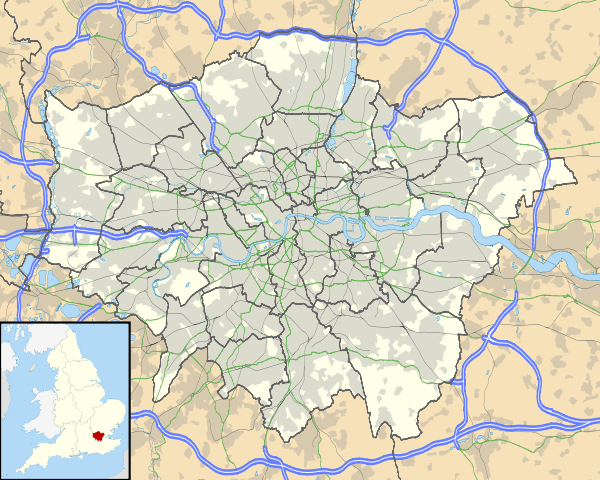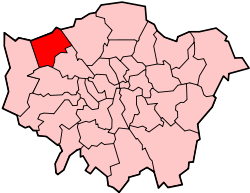Harrow, London
| Harrow | |
 Station Road, Harrow town centre |
|
 Harrow |
|
| Population | 80,213 (Greenhill, Headstone South, West Harrow, Headstone North, Roxeth, Marlborough and Harrow on the Hill wards 2011)[1] |
|---|---|
| Demonym | Harrovian |
| OS grid reference | TQ145885 |
| – Charing Cross | 11 mi (18 km) ESE |
| London borough | Harrow |
| Ceremonial county | Greater London |
| Region | London |
| Country | England |
| Sovereign state | United Kingdom |
| Post town | Harrow |
| Postcode district | HA1, HA2, HA3 |
| Dialling code | 020 |
| Police | Metropolitan |
| Fire | London |
| Ambulance | London |
| EU Parliament | London |
| UK Parliament | Harrow East Harrow West |
| London Assembly | Brent and Harrow |
Coordinates: 51°35′01″N 0°20′47″W / 51.5836°N 0.3464°W
Harrow /ˈhæroʊ/[2] is a large suburban town in the London Borough of Harrow, northwest London, England. It is centred 10.5 miles (16.9 km) northwest of Charing Cross. Harrow-on-the-Hill includes the conservation area with a high proportion of listed buildings with a residential and institutional array of Georgian architecture and a few 17th century examples. Harrow gives its initial letters to a wider postcode area. The administrative offices of the borough are in the town which currently is made up of the Greenhill, Headstone South and West Harrow electoral wards; these had a population of 33,928 in the 2011 census. Harrow was a municipal borough of Middlesex before its inclusion in Greater London in 1965. Harrow is home to a large Westminster polytechnic campus and its oldest secondary schools are Harrow School and Harrow High School.
Etymology
Harrow's name comes from Old English hearg = "(heathen) temple", which was probably on the hill of Harrow, where St. Mary's Church stands today.[3] The name has been studied in detail by Keith Briggs.[4]
Arts and culture
The first and only contemporary artist-led gallery in Harrow was set up in 2010 by the Usurp Art Collective. The space is called the Usurp Art Gallery & Studios and is based in West Harrow, a bohemian part of Harrow. Usurp Art provides professional support to artists and runs the only public artists studios in the borough. It is a flagship project for Arts Council England.[5][6][7][8]
Development and history
Harrow proper is identified as one of the 11 Metropolitan centres in the London Plan.
Geography
 |
North Harrow | Wealdstone | Belmont |  |
| West Harrow | |
Kenton | ||
| ||||
| | ||||
| South Harrow | Harrow on the Hill | Northwick Park |

Harrow forms a commercial hub in northwest London, including a well-connected[n 1] town centre containing:
- two shopping centres
- Parades of shops throughout Station Road and the ascending, traditional College Road
- Over 300 m of a fully pedestranised shopping/cafe streets roads (north of St Ann's)
Harrow historically included Harrow on the Hill, which sits on top of an outlying knoll and is contiguous with the centre of Harrow. Much of Kenton and before 1716 all of Pinner were parts of Harrow, geographical facts which root the importance of Harrow as a meeting place and a place of business. Harrow Weald, is the district north of Wealdstone, both of which were historically also part of Harrow. Harrow may also include the wards of Roxeth, Marlborough, Headstone North and Harrow on the Hill as well as the Greenhill, West Harrow and Headstone South wards listed above. The combined population of these wards is 80,213 (2011).
Demography
In the 2011 census, the Greenhill ward (which covers most of the town centre) was 42% white (26% British, 13% Other, 3% Irish), 26% Indian, and 9% Other Asian.[9] The West Harrow ward (covering areas west from the centre) was 44% white (32% British, 8% Other, 4% Irish), 23% Indian, and 12% Other Asian.[10] In addition, Headstone South ward (northwest from centre) was 43% white (31% British, 9% Other, 3% Irish), 24% Indian and 9% Other Asian.[11] Harrow on the Hill ward was 47% white (34% British, 10% Other, 3% Irish), 19% Indian and 12% Other Asian.[12]
Economy
Major employers include Kodak Alaris, the Royal National Orthopaedic Hospital and Ladbrokes, which has its headquarters in Harrow.[13]
Transport
Tube/Trains
- Harrow-on-the-Hill station (Metropolitan line & Aylesbury Line)[n 2]
- West Harrow Tube Station (Metropolitan line)
- South Harrow Tube Station (Piccadilly line)
- Rayners Lane Tube Station (Metropolitan line and Piccadilly line)
- Sudbury Hill Tube Station (Piccadilly line)
- North Harrow Tube Station (Metropolitan line)
- Pinner Tube Station (Metropolitan line)
- Stanmore Tube Station (Jubilee line)
- Canons Park Tube Station (Jubilee line)
- Harrow and Wealdstone Station (Bakerloo line and London Overground)
- Kenton (Bakerloo line and London Overground)
- Headstone Lane Station (London Overground)
- Hatch End Station (London Overground)
- Northwick Park Station (Metropolitan line)
- Sudbury Hill Harrow Station
Policing in Harrow
Harrow borough is patrolled by the Metropolitan Police Service (the territorial police force in London) 24 hrs a day. The service is provided through South Harrow Police Station and Fountain House, Headstone Drive, Kirkland House, Pinner Police Station, Waitrose, Northolt Road contact points supported by 22 Safer Neighbourhoods teams.[14]
Railway accidents
On 7 August 1838 Thomas Port died from injuries received in a train accident near Harrow. His gravestone in the parish churchyard of St Mary's, Harrow-on-the-Hill, states: "To the memory of Thomas Port, son of John Port of Burton-upon-Trent in the County of Stafford, Hat Manufacturer, who near this town had both legs severed from his body by the railway train. With great fortitude, he bore a second amputation by the surgeons and died from loss of blood, August 7th 1838, aged 33 years."
On 26 November 1870 two trains collided at Harrow & Wealdstone station, killing 9 and injuring 44.[15]
On 8 October 1952 three trains collided at Harrow and Wealdstone station, killing 112 people. Of the dead, 64 were railway employees on their way to work.
Notable residents
Twin towns
Harrow is twinned with:
Notes and references
- Notes
- ↑ Harrow has a combined tube and a rail station named after the most historic part, Harrow on the Hill and 17 bus routes including a bus station.
- ↑ Not in Harrow on the Hill, as close to the foot of the hill and long outside of its ward boundary.
- References
- ↑ http://data.london.gov.uk/2011-census-ward-pop
- ↑ Wells, John C. (2008), Longman Pronunciation Dictionary (3rd ed.), Longman, p. 368, ISBN 9781405881180
- ↑ Room, Adrian: “Dictionary of Place-Names in the British Isles”, Bloomsbury, 1988. ISBN 0-7475-0170-X
- ↑ Briggs, Keith "Harrow", Journal of the English Place-name Society, volume 42 (2010), 43-64
- ↑ New art gallery opens in Harrow
- ↑ "All the news from Harrow - getwestlondon". Retrieved 16 November 2016.
- ↑ "Lifestyle: lifestyle news for West London - Get West London". Retrieved 16 November 2016.
- ↑ The second biennial International Association for Visual Culture conference, NYC, May 31-June 2, 2012. See flyer attached – The Institute for Modern and Contemporary Culture –...
- ↑ Services, Good Stuff IT. "Greenhill - UK Census Data 2011". Retrieved 16 November 2016.
- ↑ Services, Good Stuff IT. "West Harrow - UK Census Data 2011". Retrieved 16 November 2016.
- ↑ Services, Good Stuff IT. "Headstone South - UK Census Data 2011". Retrieved 16 November 2016.
- ↑ Services, Good Stuff IT. "Harrow on the Hill - UK Census Data 2011". Retrieved 16 November 2016.
- ↑ Draft Core Strategy Retrieved on 20 October 2013.
- ↑ "Harrow Contact Us".
- ↑ "Accident at Harrow on 26th November 1870 :: The Railways Archive". Retrieved 16 November 2016.
- ↑ "British towns twinned with French towns [via WaybackMachine.com]". Archant Community Media Ltd. Archived from the original on 5 July 2013. Retrieved 2013-07-20.
